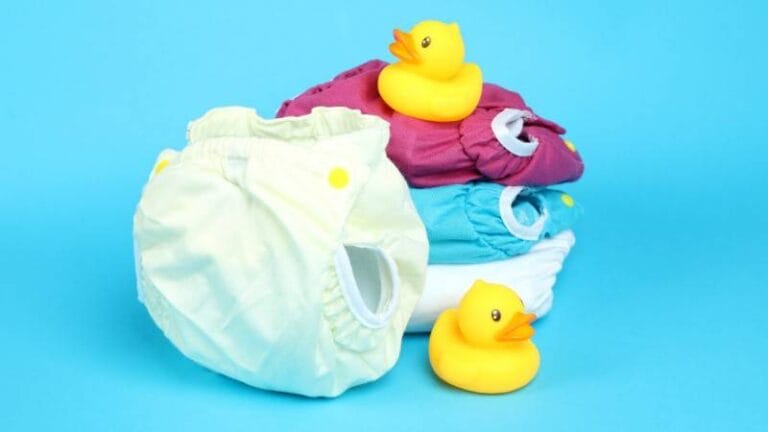Organic diapers are more than just a trend — they’re a response to growing concerns about what’s touching our babies’ skin and what’s ending up in our landfills. With conventional diapers taking centuries to decompose and containing chemicals like chlorine, phthalates, and fragrances, the shift to organic diapers is a win for both human health and the planet.
As more eco-conscious parents seek out non-toxic, plant-based, and biodegradable diaper options, the market has responded with brands that put sustainability at the core of their design. But not all organic diapers are created equal. Some go beyond clean ingredients — investing in renewable materials, ethical manufacturing, and even compostable packaging.
In this guide, we’ll explore the top organic diaper brands redefining what eco-friendly baby care can look like. If you’re searching for diapers that are gentle on your baby and tread lightly on the earth, you’re in the right place.
Let’s find out which brands are truly changing the game — one diaper at a time.
What to Look for When Buying Organic Diapers
When diving into the world of organic diapers, it’s crucial to know what to look for. It ensures we choose the best for our babies and the environment.
Certifications for Eco-friendly Diapers
Certifications are like seals of approval. They tell us if a diaper is truly eco-friendly.
USDA Organic and OEKO-TEX are two such certifications. They validate a diaper’s eco-friendly claim.
- USDA Organic ensures the diaper is made of 95% or more certified organic materials. It’s a reliable certification.
- OEKO-TEX means the diaper is free from harmful chemicals. It’s safe for a baby's skin.
Here’s a quick table to understand better:
| Certification | Criteria |
|---|---|
| USDA Organic | 95% or more certified organic materials |
| OEKO-TEX | Free from harmful chemicals |
Material and Composition
The material of the diaper is crucial. Organic materials like bamboo and cotton are best. They are better than synthetic materials found in traditional disposable diapers. Bamboo diapers, for instance, are super soft. They are gentle on the baby’s skin and prevent diaper rash.
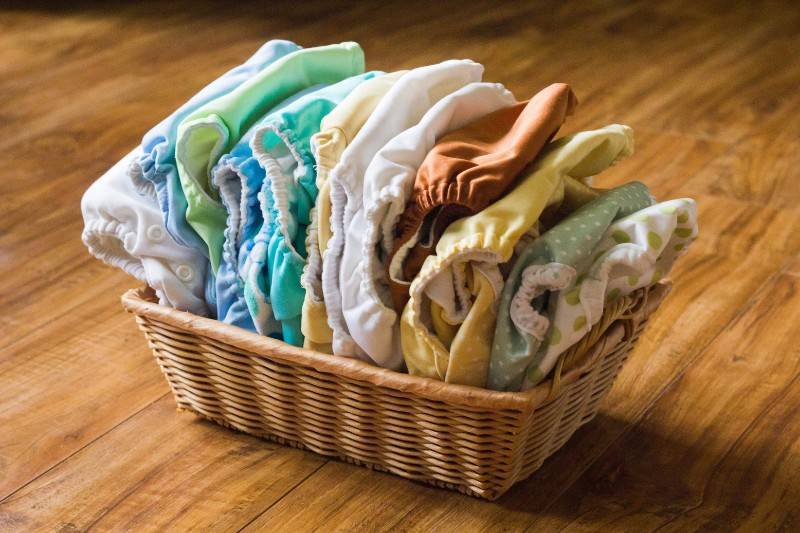
Organic materials mean no harmful chemicals. It’s safer for the baby. It’s also better for the environment. Natural diapers made of organic materials are a win-win. They are a sustainable choice in the world of baby diapers.
When choosing the best organic diapers, look for natural materials. Avoid diapers with chemicals. Look for certifications. It’s about keeping our babies happy and our planet healthy. Whether you prefer cloth diapers or disposable ones, going organic is the way forward.
Remember, the right choice of diaper brands can make a big difference. It affects your baby’s comfort and the world they will grow up in.
So, let’s choose wisely and opt for sustainable diapers that are kind to our babies and the planet!
5 Organic Diaper Brands That Parents Love
1. DYPER: Compostable Diapering With a Mission
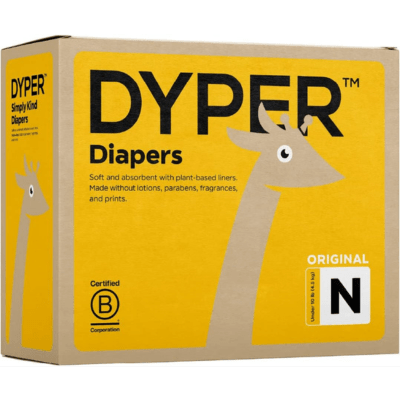
DYPER isn’t just changing diapers — they’re changing diapering. Built around a mission to minimize landfill waste, DYPER offers diapers made from responsibly harvested bamboo viscose, without chlorine, latex, or phthalates. What truly sets them apart is their REDYPER composting program, which lets eco-conscious parents send used diapers to industrial composting facilities, dramatically reducing landfill impact.
The brand’s transparency is a major win. DYPER publishes third-party lab results and certifications (including OEKO-TEX® and TÜV OK Biobased), showing they walk the walk on safety and sustainability. Their packaging is also minimal and recyclable, proving the brand takes environmental impact seriously from start to finish.
For parents looking to ditch plastic-filled disposables, DYPER makes it easy to align convenience with a cleaner conscience — one diaper at a time.
2. Eco Boom: Plant-Based Diapering That Doesn’t Skimp on Comfort
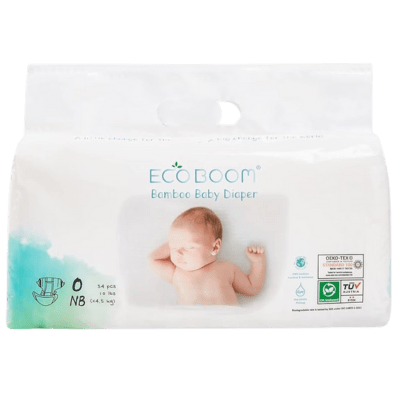
Eco Boom lives up to its name by delivering an eco-conscious punch to the traditional diaper market. Their diapers are made from sustainably sourced bamboo and FSC-certified pulp — a big win for reducing the environmental footprint of daily diapering. Free from chlorine, fragrance, and alcohol, these diapers also keep baby skin safe from harsh chemicals.
What makes Eco Boom stand out is their commitment to biodegradable materials and carbon-neutral production efforts. Even their packaging is made from renewable sources and is fully compostable — a rare but crucial move in a space often clogged with plastic waste.
While they may not shout their values from the rooftops, their manufacturing tells the story: responsibly managed supply chains, low-impact materials, and a clear move toward full-circle sustainability.
For parents who want diapers that perform without polluting, Eco Boom offers a smooth, skin-friendly experience that respects the planet at every step.
3. Products On The Go: Clean Convenience, Earth-First Thinking
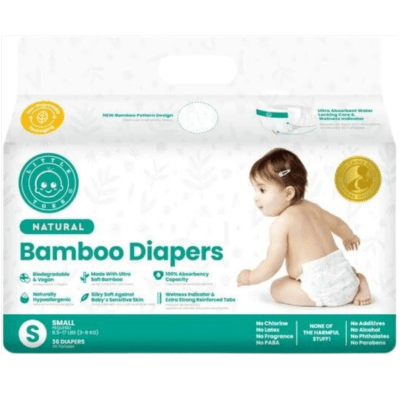
Products On The Go takes a refreshingly practical approach to sustainability. Their organic diaper kits aren’t just about the diapers — they’re about creating a grab-and-go experience that eliminates unnecessary plastic, packaging waste, and chemical overload. Designed for eco-conscious families on the move, their kits feature plant-based diapers made with certified organic materials and packaged in compostable or recyclable containers.
The brand emphasizes minimalism without compromise. Their diapers are hypoallergenic and free from harmful chemicals like chlorine, dyes, and latex. But what really elevates them is the focus on portable sustainability — making it easier for busy parents to make green choices even when they’re not at home.
Their transparency about ingredient sourcing and material safety builds trust, while the streamlined packaging reduces environmental waste at every stage. Products On The Go proves that ethical manufacturing and mobile convenience can go hand in hand — without leaving a trail of waste behind.
4. Terra: Premium Protection Rooted in the Earth
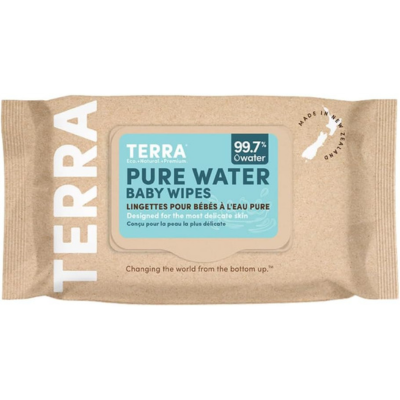
Terra isn’t just offering diapers — they’re building a better world from the bottom up. Based in New Zealand, Terra’s approach to baby care is deeply rooted in clean manufacturing, renewable materials, and full transparency. Their diapers are crafted with FSC-certified wood pulp and a bamboo blend that’s both compostable and sustainably sourced.
What really puts Terra on the eco map? Their zero-waste production model. Every diaper is manufactured in a facility powered by renewable energy, and water from the production process is filtered and reused. They also use non-toxic inks and minimal, recyclable packaging — proving their sustainability claims are more than skin-deep.
Terra goes the extra mile with certifications like TÜV Austria OK Compost and OEKO-TEX®, which back their safety and biodegradability claims. It’s luxury with a conscience — and a rare example of a brand balancing high-end quality with serious environmental accountability.
For parents who want the softest care and the smallest footprint, Terra delivers on both fronts — beautifully.
5. Eco by Naty: Pioneering the Eco-Diaper Movement Since the '90s
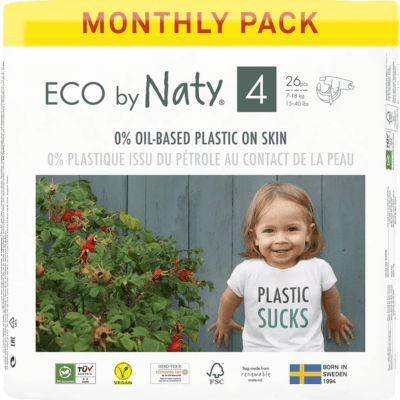
Eco by Naty isn’t just part of the organic diaper movement — they helped start it. Since 1994, this Swedish brand has led the charge toward a plant-based, plastic-free future in baby care. While other brands are just catching up, Naty has spent decades refining diapers that are certified bio- and compostable, without skimping on absorbency or comfort.
The brand’s strongest asset is its transparency. They openly list ingredients, manufacturing processes, and third-party certifications like Vincotte OK Biobased and FSC. Their diapers use plant-based materials for the backsheet and core, eliminating petroleum-based plastics almost entirely.
But their sustainability doesn’t stop at the product — Naty’s packaging is also made from renewable and recyclable materials, reinforcing their full-circle commitment to reducing waste.
Eco by Naty is a top pick for families who want cradle-to-compost accountability with every change. Their legacy, commitment to innovation, and rigorous eco standards make them a trusted name in the organic diaper world — and a brand that’s not just talking green, but living it.
Are Organic Diapers Worth the Investment?
When it comes to choosing diapers, many parents find themselves pondering whether to go for organic options or stick to the regular ones. The primary concern is often the cost, as organic diapers tend to be pricier upfront.
But are they worth the investment?
Let’s delve into a comparative analysis to understand the value and long-term benefits of choosing organic diapers.
Cost Comparison: Organic vs. Regular Diapers
When comparing the costs, it’s crucial to look beyond the initial price tag and consider the long-term value and benefits. For instance, Dyper offers organic diapers at $99.99 per pack, containing 204 individual diapers.
In contrast, a pack of Pampers Swaddlers Diapers costs $53.14, offering 150 individual diapers.
| Dyper Diapers | Pampers Swaddlers Diapers | |
|---|---|---|
| Cost | $99.99 per pack | $53.14 per pack |
| Quantity | 204 individual diapers | 150 individual diapers |
| Cost per Diaper | Approximately $0.49 | Approximately $0.35 |
While the cost per diaper is lower for Pampers Swaddlers, it’s essential to weigh this against the benefits of organic diapers. Organic diapers, like those from Dyper, are made with eco-friendly materials, reducing the environmental impact and offering a sustainable diapering solution.
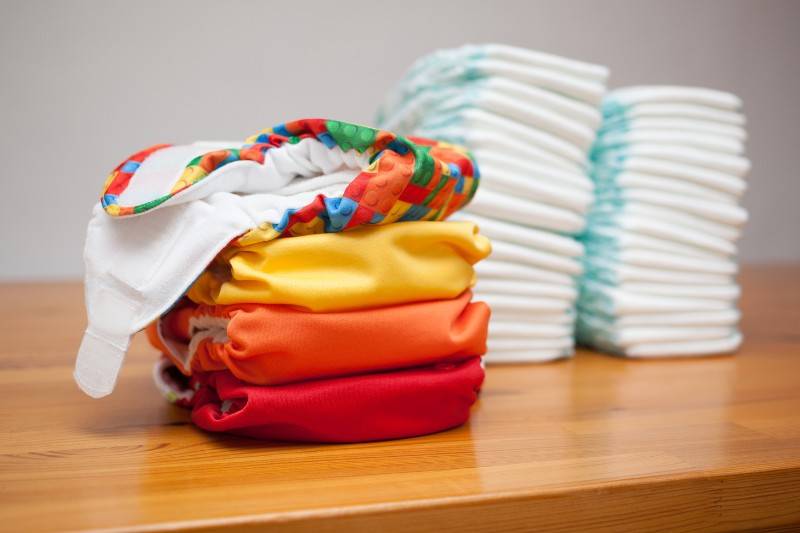
They are also free from harmful chemicals, minimizing the risk of diaper rash and other skin irritations, making them a safer choice for your baby’s skin.
Moreover, the use of organic diapers contributes to a cleaner environment as they are often biodegradable, reducing landfill waste. This is especially significant considering the alarming rate at which disposable diapers fill up landfills and the hundreds of years they take to decompose.
Long-term Benefits and Value
Investing in organic diapers is not just about the cost; it’s about the value they bring in the long run. They are a more sustainable choice, contributing to environmental conservation.
The absence of harmful chemicals and the use of natural materials ensure the well-being of your baby, potentially saving on medical bills related to skin conditions.
While the initial investment in organic diapers may be higher, the long-term benefits to both your baby and the environment make them a worthwhile investment. Choosing organic is choosing a healthier, more sustainable future for our children.
Environmental and Health Impact of Eco-Friendly Diapers
Choosing organic diapers over conventional disposable ones is not just a matter of personal preference; it’s a decision that has profound implications for both the environment and the health of our little ones.
Let’s explore how opting for eco-friendly diapers can make a significant difference.
Environmental Benefits of Sustainable Diapers
Organic diapers, renowned for their sustainable attributes, play a crucial role in reducing waste and pollution. Unlike traditional disposable diapers, many organic options are biodegradable, mitigating the burden on our landfills. The production of eco-friendly diapers often involves responsible sourcing and manufacturing practices, minimizing the ecological footprint.
The staggering amount of waste generated by disposable diapers is alarming, with millions ending up in landfills every year. These conventional diapers take hundreds of years to decompose, releasing harmful chemicals and contributing to environmental degradation.
In contrast, eco-friendly diapers decompose much faster, reducing long-term waste and pollution.
Health Benefits of Biodegradable Diapers
When it comes to the health of our babies, organic diapers offer unparalleled benefits. They are devoid of harmful chemicals, dyes, and fragrances commonly found in regular disposable diapers. This absence of toxins significantly reduces the risk of diaper rash, allergies, and other skin irritations, safeguarding the delicate and sensitive skin of babies.
The natural materials used in eco-friendly diapers, such as bamboo and organic cotton, are not only gentle on baby’s skin but also highly breathable, preventing overheating and discomfort. This breathability is crucial in maintaining a healthy skin environment, reducing the likelihood of bacterial growth and infections.
Moreover, the hypoallergenic properties of organic diapers make them an ideal choice for babies with sensitive skin, providing comfort and reducing the chances of adverse reactions.
Parents can have peace of mind knowing that their babies are not exposed to harmful substances that can have long-term health implications.
The Dark Side of Regular Diapers: A Look at Toxic Chemicals
Regular diapers, while convenient, hide a sinister secret: they often contain a cocktail of harmful chemicals. These chemicals not only pose a risk to the delicate skin of babies but also contribute to environmental degradation.
Let’s delve deeper into the toxic elements found in traditional diapers and their adverse effects.
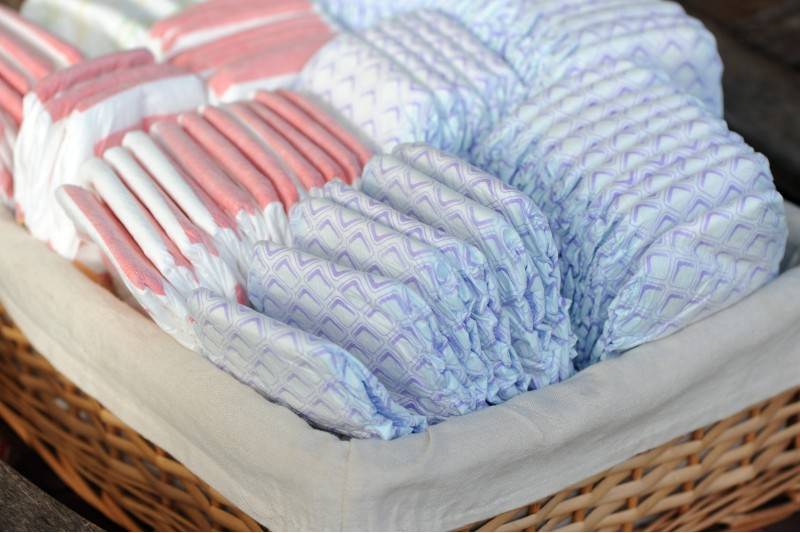
Dioxins and Chlorine
Dioxins, highly toxic by-products of chlorine bleaching, are often found in disposable diapers. These compounds are known to be carcinogenic and can cause reproductive and developmental issues, damage the immune system, and interfere with hormonal functions.
The environmental impact of dioxins is equally alarming, as they persist in the environment and accumulate in the food chain, affecting both wildlife and humans.
Tributyltin (TBT)
Tributyltin is another harmful substance found in some diaper brands. It is toxic and can disrupt hormonal functions, leading to problems in the development of the immune and nervous systems in babies.
Latex
Latex is used in some diapers to provide elasticity. However, it can cause allergic reactions in some babies, leading to redness, swelling, and irritation in the diaper area.
Phthalates and Parabens
Phthalates are used to make plastics soft and flexible, and parabens are used as preservatives. Both chemicals are endocrine disruptors and can interfere with the normal functioning of hormones, potentially leading to developmental, reproductive, and neurological damage.
Fragrance
Many disposable diaper manufacturers add synthetic fragrances to mask unpleasant odors. These fragrances can contain multiple chemicals, including allergens and irritants, which can cause skin reactions and respiratory issues in babies.
Choosing Organic Diapers That Actually Walk the Eco Talk
Finding the right organic diapers isn’t just about what touches your baby’s skin — it’s about choosing brands that align with your values. From DYPER’s compostable returns to Eco by Naty’s decades-long commitment to plastic-free diapering, these brands are doing more than just selling a product — they’re reshaping what sustainability looks like in baby care.
Each of the brands featured here brings something unique to the table: waste-free packaging, renewable materials, ethical sourcing, and real transparency. They prove that organic diapers can be high-performing, skin-safe, and planet-friendly — all at once.
So whether you’re looking for compostable solutions, travel-ready kits, or long-trusted green pioneers, these companies offer a chance to support both your child’s future and the planet they’ll grow up in.
